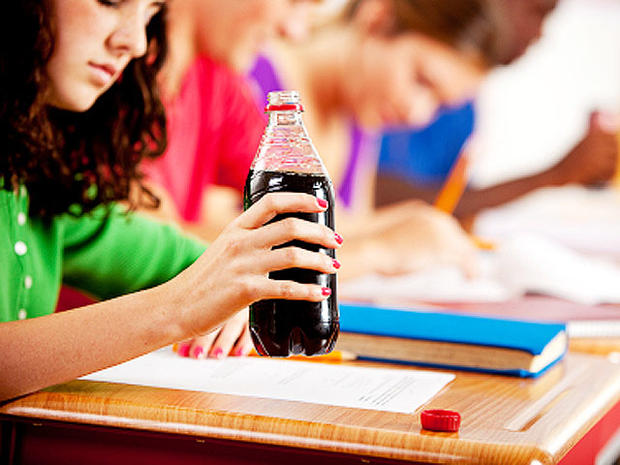Swapping sugary drinks out of teens' homes curbs weight gain, study finds
(CBS News) Doctors and health advocates have long warned of a link between sugar-sweetened beverages and obesity.
But as critics inside and outside the medical community often point out, studies reporting links between the drinks and the obesity epidemic don't necessarily prove cause and effect, and many other factors such as genetics, socioeconomic status and overall diet, may have contributed.
Pictures: New York City's ban on big sodas
New York City's sugary drink limits: What's next?
Now, a new randomized control trial - considered the research gold standard because it controls for factors that observational studies can't - has found that teens who drink lots of sugary drinks can lose weight if they swap the sodas for non-caloric beverages such as water or diet drinks.
The research was led by Dr. David Ludwig, director of the New Balance Foundation Obesity Prevention Center at the Harvard-affiliated Boston Children's Hospital. It's published in the Sept. 21 online issue of the New England Journal of Medicine.
"There have been few well-controlled clinical trials to examine this issue," Ludwig told CBSNews.com.
His new study involved 224 overweight and obese ninth and tenth-graders (124 boys, 100 girls) who were habitual sugar-sweetened beverage drinkers, meaning they had either a 12-ounce sugary drink or 100 percent fruit juice every day.
They split students into two groups, one of which received a delivery every two weeks of non-caloric beverages such as water, flavored-water and diet drinks for one full year. The other group that served as controls received no non-caloric drinks but were mailed a $50 gift card to a supermarket at four and eight months (with no instructions on what to use it on) to ensure they wouldn't drop out of the study.
Ludwig said the researchers wanted to see if solely changing the teen's household environment to carry fewer sugary drinks would have an effect on his or her weight without a behavioral intervention explicitly promoting weight loss.
It turns out that simply swapping the drinks out of the home helped. After statistically ruling out other demographics so the only difference between groups would be sugary drink intake, teens who had the non-caloric deliveries gained an average of four fewer pounds over the course of a year than soda drinkers in the control group.
The effect was strongest in children who were Hispanic, who gained a whopping 14 fewer pounds than the control group. Ludwig said this may be explained by research that suggests U.S. Hispanics create more insulin in response to sugar than non-Hispanics, and more insulin may lead to weight gain.
While Ludwig agrees obesity extends beyond one single dietary factor, he said his research shows sugary beverages should be near the top as a potentially easy target that could have an impact on weight gain.
"No other single food product has been shown to change body weight by this amount over a year simply through its reduction," Ludwig said.
The researchers then discontinued the deliveries and followed-up one year later. They found the difference in weight loss between groups was diminished.
"I would argue, that is the nature of an environmental change," said Ludwig. "Once the environment reverts back to the preexisting state, the behaviors revert. If a statin reduces cholesterol and you stop the statin, you wouldn't expect the effects of the cholesterol to be permanent."
Ludwig says the study lends support for changing a person's environment through public health initiatives. In New York City, changing the environment in local restaurants and eateries was the goal of Mayor Michael Bloomberg and health officials for the newly approved ban on sugary drinks larger than 16 ounces.
Ludwig said he would go even further, recommending larger-scale public health interventions like restricting sugary drink advertising directed at children, making high-quality water freely available and convenient in schools (not just at far away water fountains), and implementing a soda tax of a cent or two per ounce. He concedes such measures would be "politically dicey."
"A simple focused intervention based on one dietary product to be able to produce weight loss in one year suggests this has major public health potential," he said.
About 18 percent of adolescents ages 12 through 19 are obese, according to the Centers for Disease Control and Prevention.
"We know, and science supports, that obesity is not uniquely caused by any single food or beverage," the American Beverage Association said in a statement emailed to CBSNews.com. "Thus, studies and opinion pieces that focus solely on sugar-sweetened beverages, or any other single source of calories, do nothing meaningful to help address this serious issue."
